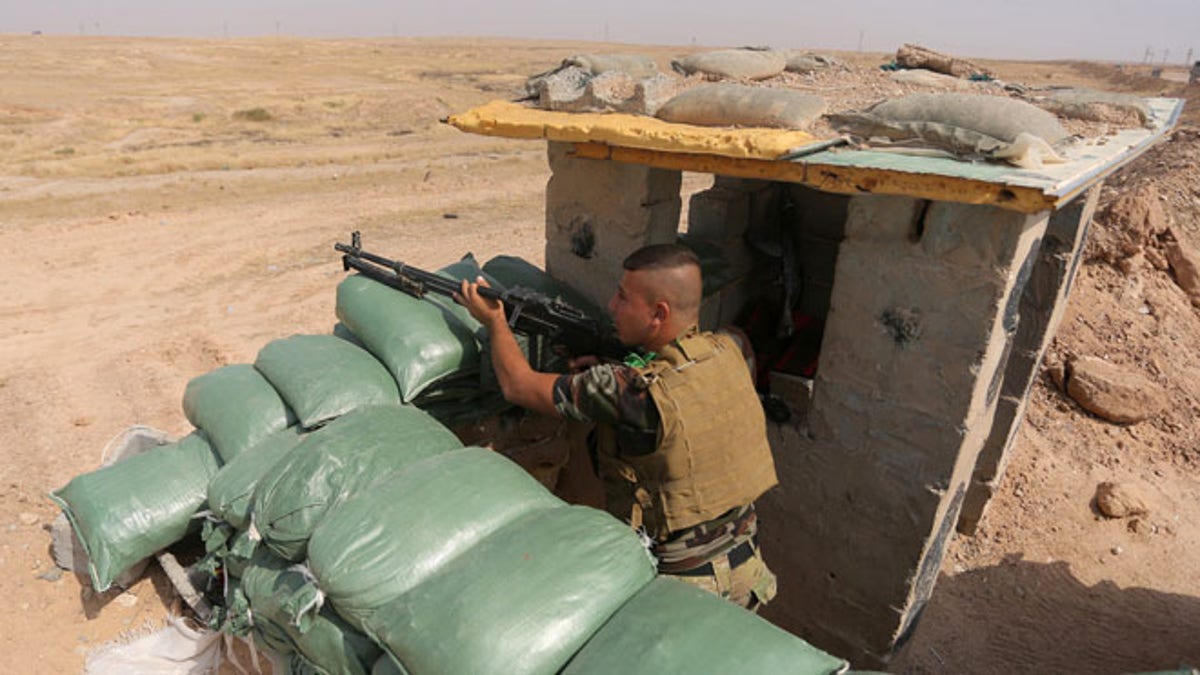
Oct. 2, 2014: An Iraqi Shiite militiamen takes cover after clashes with militants from the Islamic State group (AP Photo/Jaber al-Helo)
BAGHDAD – Islamic State group militants armed with a rocket launcher shot down an Iraqi military attack helicopter Friday in the country's north, authorities said, highlighting their ability attack aircraft as a U.S.-led coalition expands its efforts to combat the extremists.
Fighters downed the Mi-35 helicopter between the towns of Beiji and al-Senniyah in northern Iraq, an official with the Iraqi Defense Ministry said. An official with the Iraqi air force corroborated the information, saying the helicopter's pilot and co-pilot were killed in the crash.
Beiji, located 130 miles north of Baghdad, is home to Iraq's biggest oil refinery.
Both officials spoke on condition of anonymity as they are not authorized to speak with journalists. Supporters of the Islamic State group on social media also reported the helicopter being shot down.
Militants with Islamic State group have taken over parts of western and northern Iraq this year, causing the Iraqi military to fracture while tensions intensified between Muslim sects. When fighters conquered Mosul, Iraq's second-largest city, in June, the U.S.-trained Iraqi military crumbled, and the militants seized tanks and other military equipment, helping to steamroll their onslaught.
The shoot down of the helicopter shows the Islamic State group's ability to counter air operations, potentially putting at risk U.S.-led airstrikes in the country. U.S. Central Command said it had carried out airstrikes in Sinjar and Fallujah over Thursday and Friday.
Iraq's Prime Minister Haider al-Abadi has embarked on a plan to restructure the military and vowed to create a national guard that will defend the country and protect civilians without promoting sectarianism.
On a visit Friday to Baghdad, John Allen, the U.S. special presidential envoy for the global coalition to counter the Islamic State group, said operations to retake Mosul will start "within a year," saying that tactical setbacks with the Iraqi military are due to leadership problems. He praised al-Abadi's efforts to form a national guard, noting the initiative is still in its infancy, and said the only way to carry it out successfully is through inclusion of the Sunni tribes.
"There will be a full-blown conversation about this to engage the tribes where possible to operate in conjunction with Iraqi security forces," Allen told journalists. "As this concept of the national guard continues to flesh out ... the national guard will benefit from recruitment out of the tribes."
"Eventually we'll see coalition elements helping to train those brigades as well," he added.
Al-Abadi's predecessor and Iraq's prime minister for eight years, Nouri al-Maliki, was accused by many of monopolizing power and alienating ethnic and religious minorities from key posts in the government and military. They also said al-Maliki, a Shiite, dismissed many qualified Sunni officers from the military, replacing them with less qualified Shiite officers loyal to him, sparking the leadership crisis in the country's security forces.
Iraq's most revered Shiite cleric also called on al-Abadi to create a national security force that doesn't promote sectarianism at a time of heightened tensions between ethnic and religious groups.
The national guard, proposed by al-Abadi, should be a force of "patriotism and purity" to help pull the country out of the crisis, the reclusive al-Sistani said in his Friday sermon delivered by his spokesman Abdul Mehdi Karbalaie in the city of Karbala.
There must be "careful selection with regard to sectarianism or ethnicity or national building within the national guard, so that it does not generate feelings among the enrollees that they are defending certain sects," al-Sistani said.
An Iraqi Cabinet also was selected on Sept. 8, with the exception of the key posts of the defense and interior ministers, with lawmakers failing to agree on who should be nominated. Al-Sistani called upon al-Abadi to select candidates for these critical roles following the coming Islamic holiday of Eid al-Adha.
